Electoral Politics: Cartoon Explanations and answers to intext-questions of the chapter ‘Electoral Politics’ are given here. All explanations and answers are given in easy language to make them well understandable for students.
Click here for more of such Study materials on Class 9 Political Science
Electoral Politics Cartoon Explanations and Intext Question Answers

Page – 35
Q. Do most leaders fulfil their election promises?
Ans. No, most of the leaders do not fulfil their election promises. It is the biggest complaints of voters in India that politicians make promises to get votes but they fail to fulfil them and their after-election behaviour is mostly indifferent to ward the voters.

Answers:
(i) Elections can lead to changes in the policy of the government.
Ans. Right
(ii) The Governor invited Devi Lal to become the Chief Minister because he was impressed with his speeches.
Ans. Wrong
(iii) People are unhappy with every ruling party and vote against it in the next election.
Ans. Wrong
(iv) The party that wins the election forms the government.
Ans. Inadequate information
(v) The election led to a lot of economic development in Haryana.
Ans. Wrong
(vi) The congress Chief minister need not have resigned after his party lost elections.
Ans. Inadequate information
Page – 36

Q. We have seen why democracies need to have elections. But why do rulers in non-democratic countries need to hold elections?
Answer: Rulers in non-democratic countries need to hold elections because they want to show the world that they are not unpopular and they have the support of the people of the country, and so that their image improves in the eyes of the world.
Secondly, they want to show that their government and position has been
achieved legally and according to the constitutional provisions and therefor they are the valid rulers.
For example, Elections are also held in China, Russia and some other countries with no change in rulers for a considerably longer time.

Page – 37
Q. Ah! So, elections are like exams where politicians and parties know if they have passed or failed. But who are the examiners?
Answer:
The examiners in this case are the voters, who give them marks in the form of votes during elections i.e. the exams of politicians and parties contesting to succeed. These votes are counted to know which party has got the maximum votes and hence the maximum seats out of total 543 in Lok Sabha Elections. The states vary in their total allocation of Assembly Seats.
The highest seat winners form the government – alone or with any coalition formed to get the majority in the Parliament or State Assemblies.
Page – 38
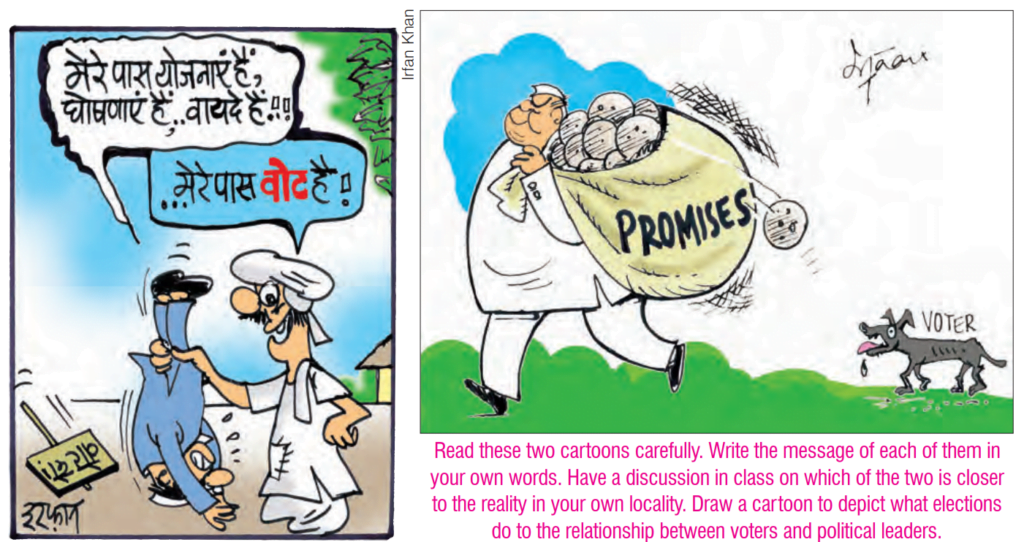
Q. Read the two cartoons carefully.
1. Write the message of each of them in your own words.
Message of Cartoon one: The cartoon shows the power of a vote of a common man in a democracy during elections. These votes write the fate of a politician. It is this voting power that is decisive in bringing the politicians to power. Politicians are nowhere near the governing power if they fail to get sufficient votes from people. The irony is that politicians fail to fulfil their promises and then the voters show their face as shown in the cartoon. The common man in the cartoon makes mockery of the promises projected by the politician by turning him down just to show that he does not deserve votes in the name of false promises and they can be kept out of power by the decisive votes of a common man during elections.
Message of cartoon two: The cartoon shows the cunningness of politicians in the name of promises and the misery of a common man after elections. The politicians make superficial elaborate promises to get votes and don’t fulfil them after getting elected. The poor voters are left at the mercy of their elected leaders. The politician is shown taking his premise back with him instead of fulfilling them for and among the people. The dog is shown hungry and looking piteously at a falling loaf of promise with a hope that let at least anyone promise be fulfilled. The cartoon shows how the corrupt and unwilling politicians behave after the elections are over. The voters have e to wait till next elections to teach such corrupt politicians a lesson as shown in the first cartoon.
2. Have a discussion in class on which of the two is closer to the reality in your own locality.
Do yourself.
3. Draw a cartoon to depict what elections do to the relationship voters and political leaders.
Do yourself
Page – 38


Q. Why is the boundary of the Gulbarga Lok Sabha Constituency not the same as the district boundary of Gulbarga? Draw a similar map for your own Lok Sabha constituency.
Answer: it is a matter of population. One of the features of a democratic election is that every vote should have equal value. That is why our Constitution requires that each constituency should have a roughly equal population living within it. The population of Gulbarga, the largest district in Karnataka, is much more than needed for a Lok Sabha constituency. This larger population cannot be adjusted in a single Lok Sabha constituency and therefore there are more than on constituency in the same district. Thus, the boundary of Gulbarg Lok Sabha Constituency is not the same as the district boundry of Gulbarga.
Q. How many Assembly constituencies are there in the Gulbarga Lok Sabha constituency? Is it
the same in your own Lok Sabha constituency?
Answer: There are 8 Assembly constituencies in the Gulbarga Lok Sabha constituency.
Page – 40

Q. Like in Panchayats should we not have at least one third seats in the Parliament and Assemblies reserved for women?
Answer: Women constitute half of the population yet are not properly represented. It is true that one-third of the seats are reserved for women in the Panchayats but, unfortunately, even today representation of women in the State Assemblies and Parliament is very low and this situation needs to be rectified by providing at least one-third reservation of seats for women in parliament and Assemblies.
Reservation is not good in principle as it undermines merit, talent and quality but it becomes warranted to bring the downtrodden groups and women at par with the others who are capable by wealth or caste or family.
Reservation is a tool and a means to bring balance in any society or organisation or institution but it should not be made an end itself.
Page – 41
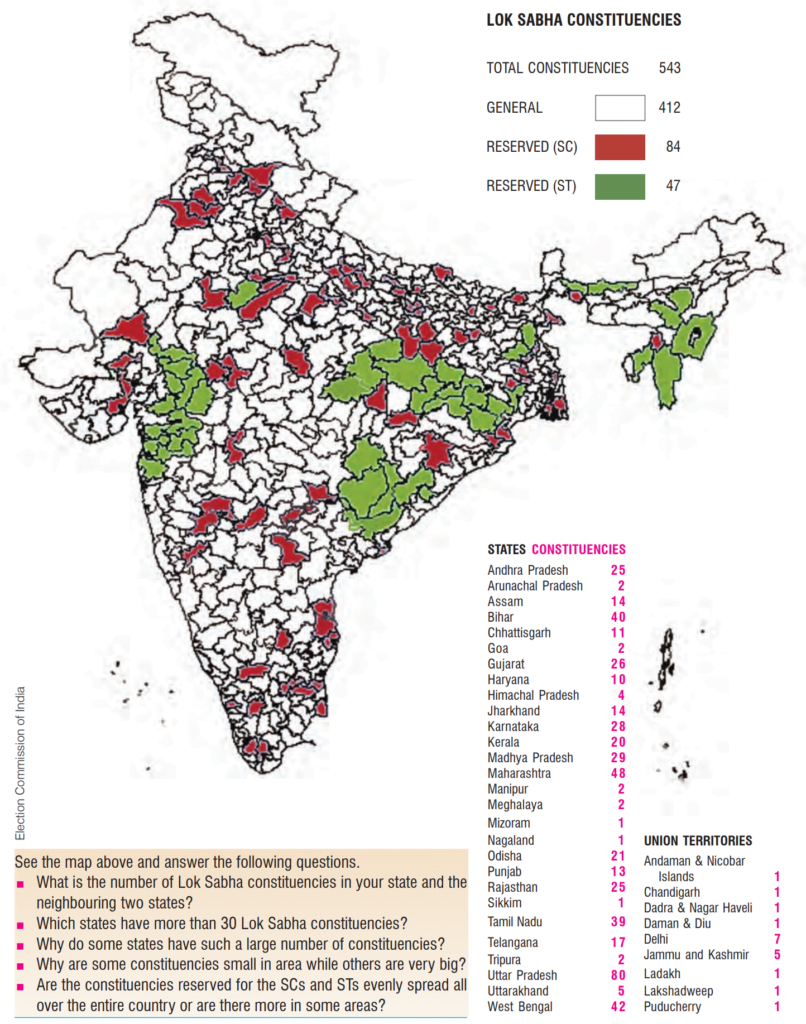
Q, See the map above and answer the following questions.
(i) What is the number of Lok Sabha constituencies in your state and the neighbouring two states?
Ans. Do it yourself.
(ii) Which states have more than 30 Lok Sabha constituencies?
Ans. The states which have more than 30 Lok Sabha constituencies are Andhra Pradesh, Bihar, Maharashtra, Tamil Nadu, Uttar Pradesh, West Bengal.
(iii) Why do some states have such a large number of constituencies?
Ans. Some states have large number of constituencies because of their population. Here, voters are in large numbers.
(iv) Why are some constituencies small in area while others are very big?
Ans. The coverage of each constituency is fixed of the basis of number of the voters. The area does not matter. If a smaller area has equal number of voters as a big area, both will be treated as constituencies.
(v) Are the constituencies reserved for the SCs and STs evenly spread all over the entire country or are there more in some areas?
Ans. The constituencies are reserved for the SCs and STs on the basis of the distribution of their population. So, the constituencies reserved for the SCs and STs are not evenly spread all over the entire country.
Page – 42

Q. Why are the candidates required to give a detailed statement of their property?
Answer: The voters should know about the wealth and property of the contesting candidates; it will help them decide their voting preference. A corrupt leader amasses wealth in a shorter period of time Voters may decide to vote for a poorer candidate than a richer one.
With this purpose it has been made mandatory by the Election Commision that a candidate has to give information about his assets movable and immovable, debts to financial institutions, tax status, income and wealth. It is assumed that it will act as a check on misuse of money power in elections but it left on the voters to apply this check by negating wealthy candidates.
Page – 44
Q. Match the following features of our electoral system with the principles they reflect.
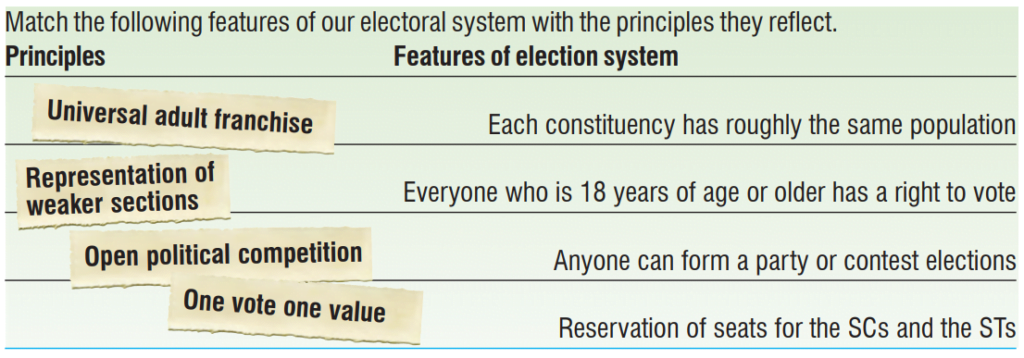
Answer
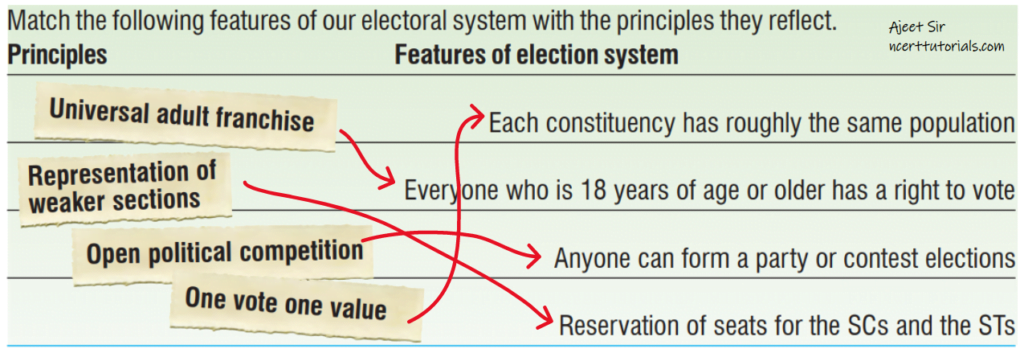
Page – 46
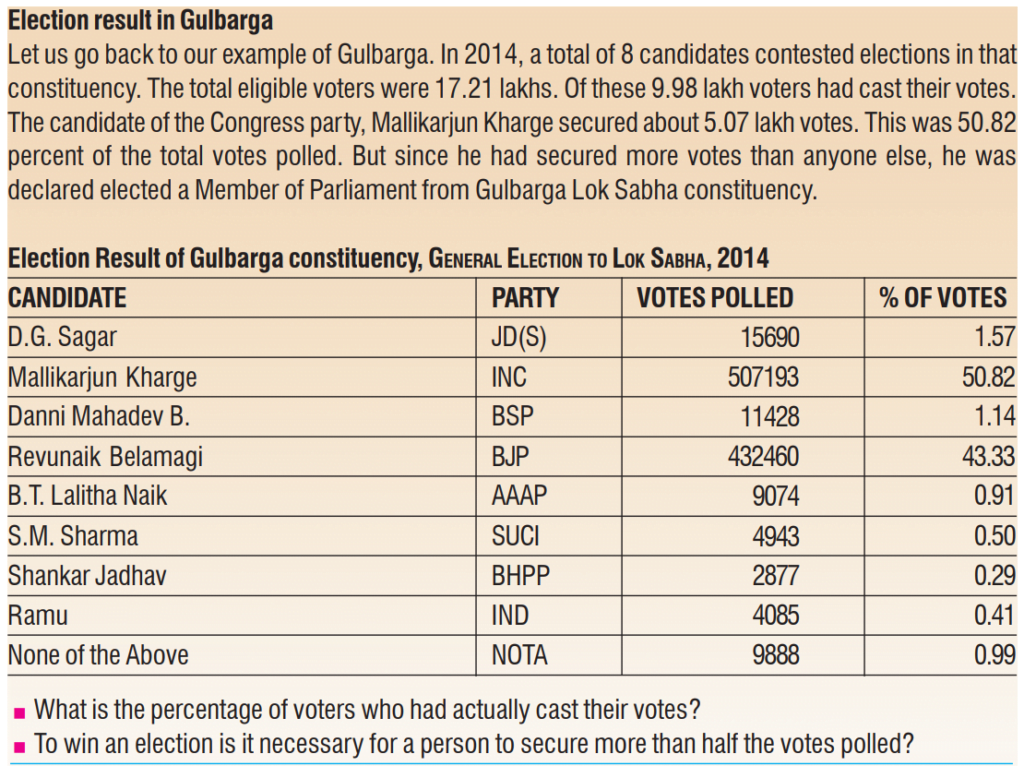
Q. What is the percentage of voters who had actually cast their votes?
Ans. 50.82 per cent.
Q. To win election is it necessary for a person to secure more than half the votes polled?
Ans. No, it is not necessary for a person to secure more than half the votes polled. It may be that the winning candidate secures less than half of the votes because the candidate who secures the highest number of votes from a constituency is declared elected.

Q. Why are party agents present in the polling booth and the counting centre?
Answer: Party agents are present in the polling booth to ensure that the voting takes place in a fair manner and rival candidates are unable to adopt any unfair practices.
Any fraud or illegal activity by any party can be checked as other party agents are also present there. They will object and raise voice at such unfair activities at the polling booths.
Polling agents are also present inside the counting centers to ensure that the counting is done properly without any unfair means.

(Check Your Progress)
Q. Identify the fair and the unfair electoral practices among the following:
(i) A minister flags off a new train in his constituency a week before polling day.
Ans. Unfair electoral practice
(ii) A candidate promises that she will get a new train for her constituency if she is elected.
Ans. Fair electoral practice
(iii) Supporters of a candidate take the voters to a temple and make them take an oath that they will vote for him.
Ans. Unfair electoral practice
(iv) The supporters of a candidate distribute blankets in slums in return for a promise for vote.
Ans. Unfair electoral practice
Page – 47

Q. Why does the Election Commission have so much power? Is this good for democracy?
Answer: In India we have a powerful and independent Election Commission. These powers are given to conduct free and fair elections without any pressure from the ruling government.
Yes, it is good for democracy because elections and electoral practices are at the core of a democratic setup. People want free and fair elections in which they can vote freely to choose their leaders. A powerful Election Commission can ensure free and fair elections by preventing malpractices and unfair means in the elections.
Elections should be conducted without any bias or any pressure. A powerful Election Commission does this job efficiently.
Page – 48
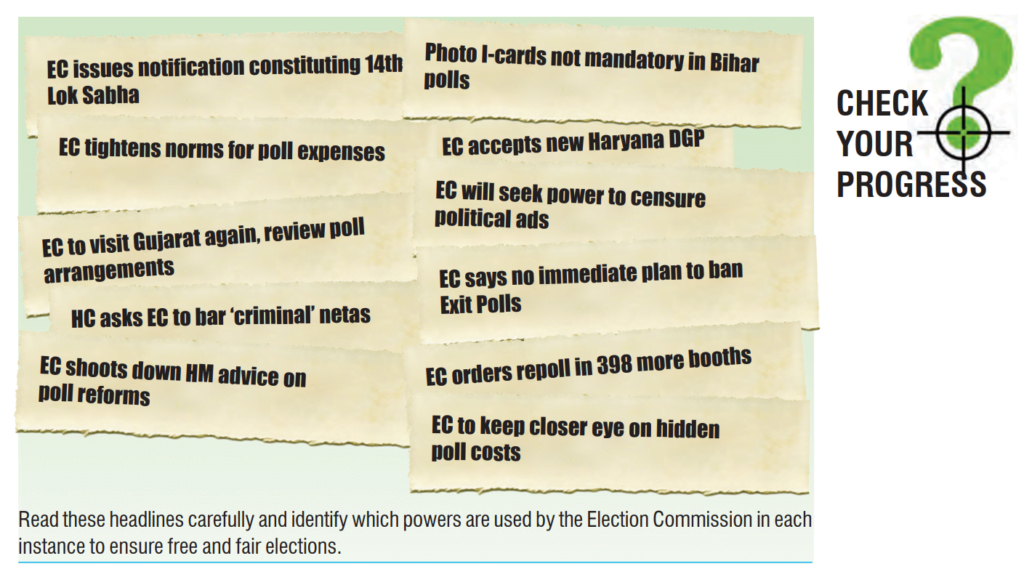
Q. Headlines and identification of powers used by the Election Commission.
(i) EC issues notification constituting 14th Lok Sabha
Ans. EC takes decisions on every aspect of conduct and control of elections, from the announcement of elections to the declaration of results.
(ii) Photo I-cards not mandatory in Bihar polls
Ans. Election Commission takes decisions on every aspect of elections and control of elections from the announcement of elections to the declaration of results. It also includes the powers relating to the identification of the voters.
(iii) EC tightens norms for poll expenses
Ans. Election Commission regulates campaigns to ensure that every political party or candidate gets a fair and equal chance to complete. It also ensures that no party or candidate can spend more than Rs. 25 lakhs for election in a Lok Sabha constituency and Rs 10 lakhs for election in an Assembly constituency.
(iv) EC accepts new Haryana DGP
Ans. During the election period, the Election Commission can order the government to follow some guidelines, to prevent use and misuse of governmental power to enhance its chances to win elections, or to transfer some government officials.
(v) EC to visit Gujarat again, review poll arrangements
Ans. During the election period, the Election Commission can order the government to follow some guide lines, to prevent use and misuse of governmental power to enhance its chances to win elections, or to transfer some government officials.
(vi) EC will seek power to censure political ads
Ans. Election Commission implements the code of conduct and punishes any candidate or party that violates it.
(vii) EC says no immediate plan to ban Exit Polls
Ans. Election Commission takes decisions on every aspect of conduct and control of elections from the announcement of elections to the declaration of results. It also includes power regarding the control of the ‘Exit Polls’.
(viii) HC asks EC to bar ‘criminal’ netas
Ans. Election Commission takes decisions on every aspect of conduct and control of elections.
(ix) EC orders repoll in 398 more booths
Ans. Election Commission takes decisions on every aspect of conduct and control of elections from the announcement of elections and order to repoll to the declaration of results.
(x) EC shoots down HM advice on poll reforms
Ans. Election Commission enjoys the same kind of independence that the judiciary enjoys. It is not supposed to work on the advice of the Home Minister. During the election period, the Election commission can order the government to follow some guidelines, to prevent use and misuse of the governmental power to enhance its chances to win elections, or to transfer some government officials.
(xi) EC to keep closer eye on hidden poll costs
Ans. It implements election laws and the code of conduct and punishes any candidate or party that violates it. Thus, every party or candidate can get a fair and equal chance to compete.
Page – 50 and 51 (Read the Cartoon)

Q. The leader is coming out of a press conference, “What was need to say that we have distributed tickets only amongst suitable and winnable family relations?” Do you think that family politics is confined to only a few states or parties?
Ans. It is more or less found in each and every state and party in India. Almost every political party in India has leaders whose sons and daughters have entered politics, most of them without much political experience.

Q. Titled ‘Electoral Campaigns’, this cartoon was drawn in the Latin American context. Does this apply to India and to other democracies in the world?
Ans. Yes, this cartoon can be applicable to India and other democracies of the world. Nowadays, candidates who spend a lot of money on ‘buying votes’ often win the election. Although the Election Commission has specified the amount of money to be spent for both Parliamentary and Assembly elections, but there is always excessive use of money by the rich candidates and big parties. This cartoon suggests the misuse of money power in Parliamentary democracy.
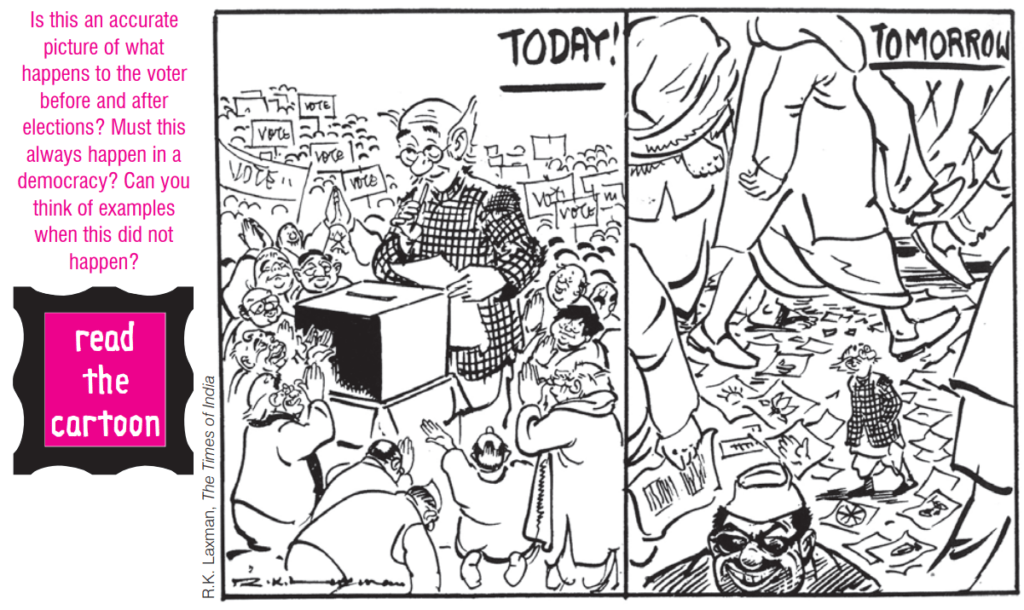
Q. Is this an accurate picture of what happens to the voter before and after elections? Must this always happen in a democracy? Can you think of examples when this did not happen?
Ans. My (Ajeet Sir) own experienced based responses are given below:
- Yes, this picture very much reflects what happens to the voter before and after election.
- It’s not an absolute rule, but it frequently occurs in democratic systems. Candidates may attempt to win over voters with insincere promises before an election. Once elected, these leaders often neglect the needs of the ordinary citizen.
- No, I cannot think of examples when this did not happen

Facts on the Indian elections and Comments on these facts
(i) The 16th Lok Sabha has 12 per cent women members.
Ans. It is the weakness of our electoral system which sends only 12 per cent women members to the Lok Sabha while the population of women is nearly 50 per cent of the total population.
(ii) The Election Commission often refuses to accept the government’s advice about when the elections should be held.
Ans. It is the strength of our electoral system which has given the power to the Election Commission to refuse or to accept the advice of the ruling party about the election dates.
(iii) The 16th Lok Sabha has more than 440 members whose assets are more than Rs.1 crore.
Ans. This is the weakness of our electoral system which does not give equal chance to both poor and rich. Those candidates, who are rich, have a better chance of winning than the poor in our country.
(iv) After losing an election the Chief Minister said: “I respect the people’s verdict”.
Ans. This is the strength of our electoral system which enjoys the faith of both the defeated and winning candidates. Barring very few disputed elections, the electoral outcomes are usually accepted as ‘people’s verdict’ by the defeated party.



please write the answer of the last question, instead of copying the question twice. thank you.
I think the answer would be the same as the 4th politoon
For anyone struggling to figure out the ans to the last question:
The first image depicts the condition before election, the way candidates treat their voters as GOD and try to build a rltnship of promises with them. They draws their attention towards some of the problems and promise to fix it. But soon after election, the changes. Candidates start to neglect their voters, and tend to forget the promises that once gained them the power that they enjoy. The citizen is left with empty promises and assurances that is never filled. This is the sad and miserable truth of the system.
ok but no one asked tho
U didn’t give the answer for the last picture based question
Now the answer is available.
aint no way for some questions you just wrote, “do yourself” 💀